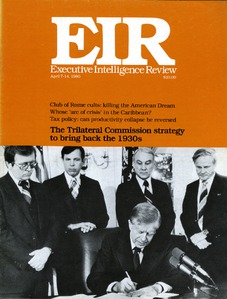Departments
From the Editor-in-Chief
by Daniel Sneider
InSight
by Nora Hamerman
“1984” ... by 1981.
Dateline Mexico
by Josefina Menendez
More oil for Japan?
Middle East Report
by Robert Dreyfuss
The Iran-Libya connection.
Campaign 1980
by Kathleen Murphy
Congressional Calendar
by Barbara Dreyfuss and Susan Kokinda
Energy Insider
by William Engdahl
How to decree a gas shortage.
Economics
Tax Policy: Can the Productivity Collapse Be Reversed?
by David Goldman and Alice Roth
How can tax policy enhance the performance of the economy? The Riemannian computer-applications model has been applied to evaluate three prominent tax proposals, that of the Joint Economic Committee’s Annual Report; that forwarded by Democratic candidate LaRouche, the Riemannian model’s designer; and the Reagan tax policy associated with economist Arthur Laffer. Only one of the proposals would actually improve industrial output, the computer showed.
JEC Tax Policy
The supply side of the tax-cut debate.
GOP Tax Policy
by Lyndon H. LaRouche, Jr.
Reagan’s advisors in debate on the issue – What Was Said in the Wall Street Journal.
The LaRouche Alternative: The Emergency Tax Reform Act of 1980
Gold
by Alice Roth
Engelhard traps the Hunts.
Foreign Exchange
by Richard Katz
Will the dollar bust?
Agriculture
by Susan B. Cohen
The farmers denounce the embargo.
Domestic Credit
by Lydia Schulman
The crunch is on.
Business Briefs
Special Report
The Trilateral Strategy To Bring Back the 1930s
by David Goldman
As Rockefeller announced at the close of the London Trilateral Commission meeting, the U.S. will be put through a crash-this time with far worse consequences intended for both America and Europe than the last great depression. The evidence is in, and assembled for every official and executive who can play a part in preventing this calculated catastrophe.
Documentation: — Henry Reuss interviewed — Reuss and Proxmire aides interviewed — The Reuss-Miller letters — The Omnibus Banking Bill — The Credit Control Act of 1969 — Proposal for a trade-war department.
I. A Bank-Collapse Bill
II. The Casualties
III. An Economic Restructuring
IV. A NATO Buildup
V. The War On Europe
Henry Reuss Talks to EIR
House Banking Chairman Demands Intervention
International
Italians and French Join in Crackdown on Terrorists
by Paul Goldstein
Unprecedented cooperation across national borders led to a major terrorist round-up in three countries. Two conclusions resulted: terrorism is a unified international deployment, and “above-ground” radical organizations have a membership interchangeable with “underground” terrorist groups.
Italy: A Carter Phone Call to a Roman Squillo
by Umberto Pascali
Latin America: A turn to the East in Trade Programs
by Mark Sonnenblick
Is Cuba Fomenting Revolution To Get Mexico’s Oil?
by Tim Rush
Including interviews with Georgetown policymakers.
A Palm Sunday Massacre in El Salvador
France-Cuba Talks Alarm Washington
International Intelligence
National
The New York Transit Strike: ‘Ordered from On High’
by L. Wolfe
A transit strike in New York could subtract enough from total national economic activity to trigger a recession all by itself. But Paul Volcker declared a transit strike in New York “a good thing.” And David Rockefeller declared a recession in the nation “a good thing.” And a transit worker said the strike could be settled immediately, “but somebody big is gumming things up.” Meanwhile, the city’s population is being acclimatized to catastrophe.
Club of Rome Death Cults: Killing the American Dream
by Mark Burdman
A conference of the U.S. chapter of the Club of Rome convened in Maryland and mapped out a massive campaign to build cults throughout the United States. Their hero: Elizabeth Kubler Ross, whose celebration of death and dying is to be applied to Americans en masse to gain their acceptance of economic collapse.
Documentation: — Elizabeth Kubler-Ross in Praise of Child Murder — “Women’s Liberation” in Club of Rome Style — Jeremy Rifkin on “fundamentalism” — An Episcopal priest on “life after growth” — Aspen Institute view of “The Great Transition” — What’s the U.S. Club of Rome.
National News



